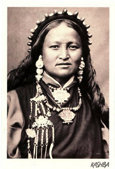Home
KASHBA Asiatica
Ais Loupatty
Ton Lankreijer
Staalstraat 6
1011 JL Amsterdam
Open 12:00 – 17:00
Zondag / Sunday 14:00 - 17:00
GESLOTEN / CLOSED
16 okt - 5 nov '25
Contact:
31-20 - 6 23 55 64
06 - 588 41 370
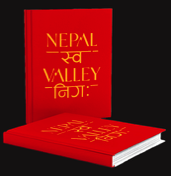
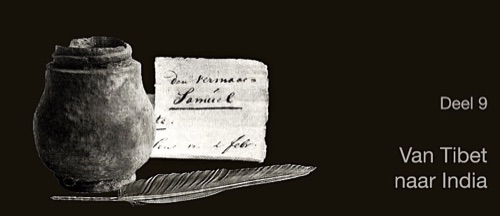
Four years after leaving Beijing, the lama group is back in Tibet. Due to amicable affairs such as the reunions in the monasteries they visited during the outward journey, but also due to illness and exhaustion, the way back lasted considerably longer. Some members dropped out or died, but all in all the group spent some eight years together.
Just before Lhasa they camp at the same site as another caravan on its way to Ladakh and India.
Given the course of the seasons, it is for Samuel to take it or leave it: join them right away or settle in Lhasa for a another winter.
He does not think twice.
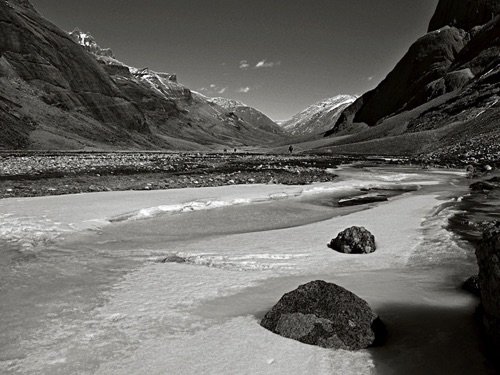
A few weeks later they pass Mount Kailash at a distance, i.e. the source of the Indus and other major rivers. Against his better judgment, Samuel tries to lure some caravan members into making a short pilgrimage to encircle the mountain. He repeats what pilgrims told him on the outward journey: it will only take three or four days, afterwards you will have lost all your old karma, you will be reborn – and we’ll surely pick up the caravan again.
But he does know that there is a substantial risk and that they actually have no time to waste. Behind them the winter is creeping up from the high plains.

For now, heaven is blue, the icy mountain air crystal clear and the landscape still faintly golden yellow - he loses himself in the silence. Not the space between two sounds but in that other, indescribable silence.
Meanwhile, the caravan traverses the Himalayas and heads towards Delhi, the seat of the Mogul Empire on the subcontinent.
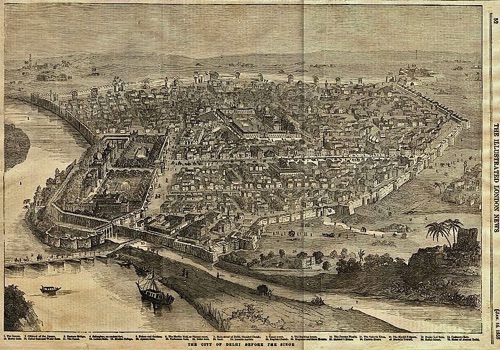
Cautiously hidden on the roof of the guesthouse, Samuel looks out over ancient Delhi. In heaven’s name, what happened last night?
In the streets below, around the Paharganj market, bodies lie scattered in puddles of blood.
From some the limbs have been cut off, in some cases even the head. Knife or sword at the present every now and then a group of Persian soldiers runs by, chasing every Indian in sight.
Delhi

As quietly and steadily as the journey from Tibet through Ladakh and Kashmir went last year, so restless and violent life is in the seat of the Mogul Empire.
A true hornet's nest.
Nadir
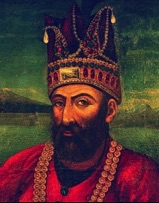
The only escape route that he still sees for himself, runs above the city over the adjacent houses. Across the numerous roofs and small terraces where more people run and rampage than on the streets. At times one hears screams of anger; most homes do not only have their kitchen on the top floor, far away from the dirt of the street, but also a small sacred corner for the household god.
Nadir
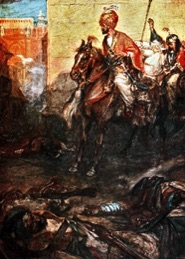
Sporadically, the guesthouse allows an acquaintance in. The first ones mourn hundreds of deaths, but later on in the day they shake their heads and stammer in disbelief: ‘Thousands!'
Little by little, the facts become clear. A month earlier, Nadir Shah of Persia and his troops had dared attack the great Mogul army.
Despite the ratio of one to six soldiers, the battle was decided within three hours.
Apparently that had given him enough confidence to presently attack the capital itself.

Na twee eeuwen – de gemiddelde duur van een groot, overheersend rijk in Azië – is het Mogolrijk in verval geraakt maar de hoofdstad is vooralsnog ongedeerd gebleven dankzij haar ongegeneerde weelde; de meeste aanvallen worden eenvoudig afgekocht.
Door onenigheid over de erfopvolging is het keizerlijk regiem de laatste jaren echter rap verzwakt en verdeeld geraakt.
Muhammad Shah
After two centuries – the average duration of a large, dominating empire in Asia – the Mogul empire has fallen into decline, but for the time being the capital has remained unharmed thanks to its unabashed wealth; most attacks are simply bought off.


In the early morning of March 22, 1739, it is rumoured throughout the city that one of the palace guards has murdered Nadir in his sleep. At once, the market traders consider themselves sufficiently safe to bombard the controlling soldiers with all sort of items; some of them are even lynched.
As soon as this news reaches Red Fort, Nadir furiously hoists himself into his most imposing regalia and rides with his small army ostentatiously into the city.
Red Fort
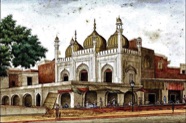
Right in front of the Sunehri Masjid ('place of prostration') on the Chandichowk market, the procession halts.
On horseback, he draws his sword with great pomp, roaring 'Qatal-E-Aam!' – a cry for revenge.
Sparing none and nothing, Nadir's
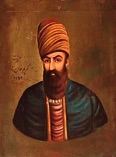

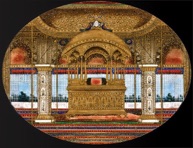
In addition to a huge amount of money and gold, Nadir seizes the peacock throne, set with 26,733 gemstones.
As well as a few huge diamonds (which have since been known separately by individual Persian names like Koh-i-Noor and Darya-ye Noor).
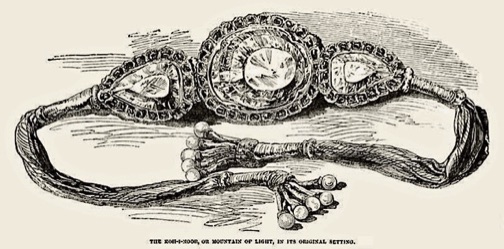
Koh-i-Nor in oorspronkelijke armband
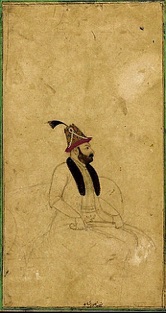
After fifty-eight days the Persian troops leave the city, accompanied by herds of elephants, camels and horses carrying their fabulous spoil.
To avoid jealousy and division in his own empire, Nadir announces complete tax exemption for the coming years upon arrival.
After the departure of Nadir's men, Samuel explores the city to see what is left of it, as well as to find a suitable caravan in a southerly direction.
Nadir's advent clearly was a fatal stab for the Mogul Empire. He looks in the neighbourhood of the Maria Chapel that the I

Thanks to a franciscan monk who was Nadir's personal physician for a time, it was known that he personally had no interest in religion – whichever.
Admittedly, he had the Quran and the Gospel read out aloud to him and simultaneously translated into Persian, but at the same time he added his, mostly mocking, commentary.
After each session, he loudly pledged that, time permitting, he would establish a new religion to replace all others.
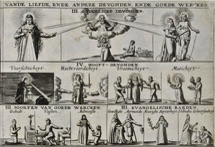
The catholic friars turn out to have fled Saint Mary's chapel in time. They managed to keep themselves concealed in a nearby building for days on end; without sufficient food, a situation that, however, most of them had experienced previously.
They are now preparing to leave for the more southerly Agra, the second
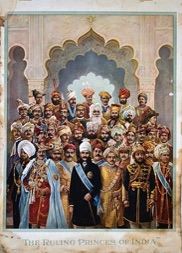
The local maharajas are no longer her vassals and issue new rules and levies as they please - also for passing caravans.
The British seem to get more influential here and there as well.
The farther away from the capital, however, the more he once again enjoys the empty desert plains. With the creaking of wooden wheels of the ox-cart as a continuous sound.
Occasionally he lets it carry him, usually during midday – 52 years is a respectable age in these regions as well.
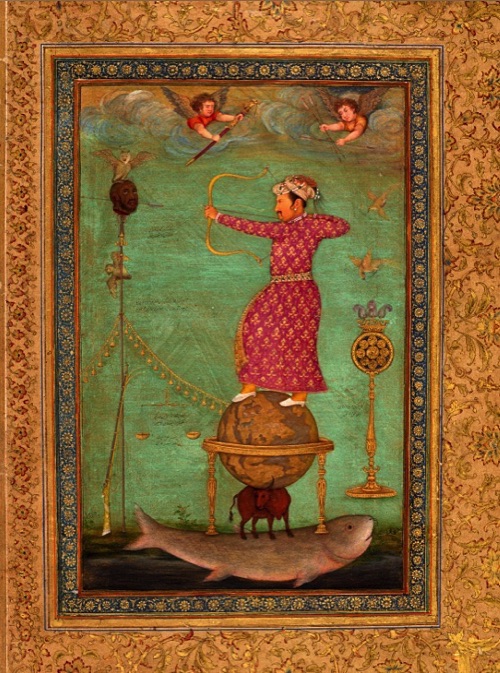
When, after a few months, they have passed Agra, yet another murderous violence looms. From the dry middle of the subcontinent, the Marathas regularly attack the fertile river banks.

On their fast horses they commit robbery and plunder – particularly there where his journey is leading: Bengal.
Samuel had already been in that area twelve years earlier, especially in Patna where he met Desideri amongst others (see part 4).
At the time he could not trek further north due to the uprising against the Mogols. He had to change his route to Nepal to come to China via Tibet. And now he can hardly proceed further south.
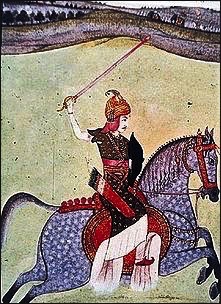
Like devastating locusts, the Marathas strip the bustling areas along the Hooghly River.
The plundering horse riders know no mercy. After their attack, just before Samuel's arrival, one of the survivors writes in a elegy:
This time none escaped, all had the same fate,
and cows were massacred along with men.
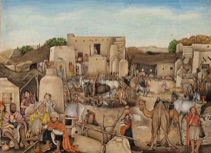
In case of attacks, the villagers flee to the settlements of the foreign merchants, which are too heavily armed for the robbing riders. The more southerly port city of Kolkata has started the construction of a wide ditch around the city.

In this part of Bengal – in the so-called 'Europe at the Ganges’ – the VOC arrived fairly early.
Along the Hooghly River the company occupies Cassimabasar, one of the most beautiful areas with a more pleasant climate.
Usually about 300 Dutchmen reside there, almost half of whom are military and a small quarter of seafarers in transit.

VOC-directorate visiting the local maharaja (with hats, second space from the left).
The long-stayers, rarely numbering more than a hundred, live like god-in-france. Around their houses, lush vegetable gardens and rolling pleasure gardens have been laid out with wide steps descending to the river.
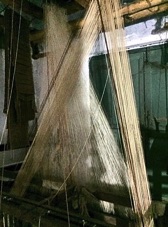
Hooghly, like Batavia and Ceylon, has its own directorate. The trade in cotton, opium, silk and sugar - as well as the smuggling thereof - simply became too profitable in recent decades. Just to prepare the reels for the looms, the company employs four thousand silk winders.
It is questionable, though, whether unofficially textiles are the most profitable product as well.
Samuel is considering to board one of the four VOC ships that sail back and forth to Batavia each year; what has to be done
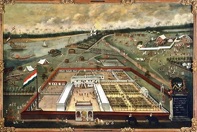
Apart from the recurrent attacks by the Maratha riders, the surrounding European competition on the west bank of the Hooghly is causing increasing discord and unrest as well, especially with the British. Just before Samuel's arrival, Sichterman had the factory firmly
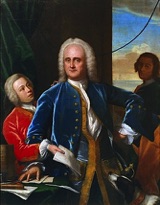
Sichterman is the type of manager who officially earns 180 guilders a month, while everything around him smells of so much more money. He is the type of colonial who lets a baby rhinoceros walk about the house and surreptitiously heats up coins before throwing them to the poor.
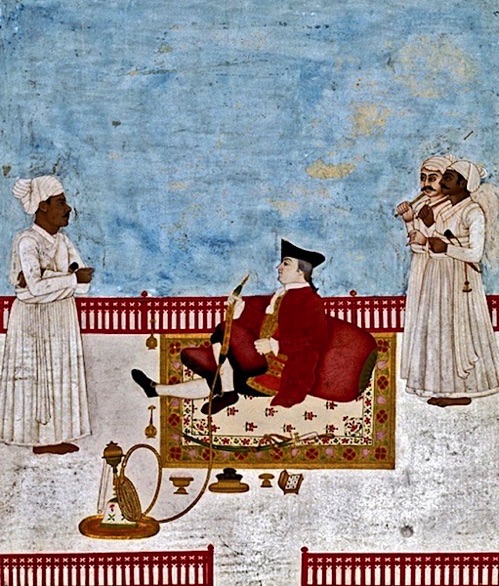
But what to write to such a man? Shaking the money bag makes little sense. Samuel, however, possesses a different kind of gold: his knowledge of areas 'of which the names have not been particularized on our geographical maps.’
He promises or pretends nothing, he only describes the route he has taken over the last fifteen years: 'Lhasa, the origin of the Ganges and Indus streams, through the lusty Kasimier, small Guzierat and Lahor'.
The hint of first-hand information about unknown and unexplored areas will certainly tickle Sichterman more than any relatively small change.
Samuel takes the letter to the main market in Patna. Between major towns on this continent there a reasonably guaranteed and dense network of couriers.
In Tibet he saw them rushing across the plateau every once in a while; at a distance it seemed as if their feet did not touch the ground.

Here on the Indian subcontinent footmen run in pairs between city markets. Along the main routes there are high, brick beacons in the landscape, between which each ‘market-messenger‘ runs barefoot, on average for about six kilometres. The inevitable pain is usually smothered in opium.
To maintain speed, neither trot nor trance should be interrupted. One carries the documents and letters, the other beats the drum to clear the way - or to keep wild animals at distance.

Because Samuel has been gaining notoriety among European colonials - as the man who did indeed explore the interior - an enthusiastic VOC writer notes in his books at Chinsura on December 17, 1742 that 'Mr Samuel van de Putte is expected in

It is a so-called Flute ship with three masts, flat bottom, wide belly, narrow deck and round stern, in short designed to ship as much cargo as possible.
The cargo consists for the lesser half of textile, silk, saltpeter, artillery goods and grain, and for the greater half of opium - at least, according to the official bill of lading.

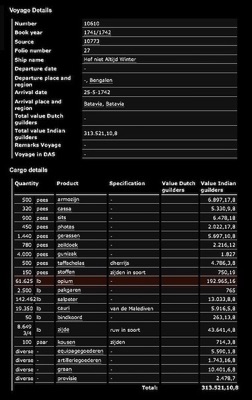
After a few days, after having stared long enough at the vast water surface of the Bay of Bengal, Samuel turns around and observes the ins and outs on board.
He notices that the mix of people is much more international than in Cochin twenty years earlier. Except Hollanders, Germans and Danes, he recognizes many Indians, Indonesians and Chinese among the many Asians.
But something else strikes him: regardless of origin, the crew tag along in pairs.
Bill of loading of fluitschip ‘t Hof
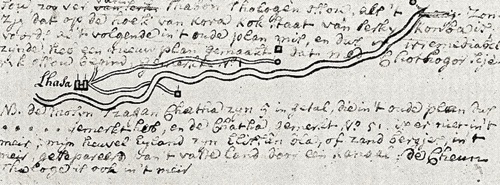
Voornaamste bronnen
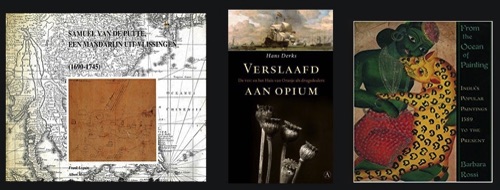
9 mei 2018 21:21
Coming from Kashmir, just above Delhi, Samuel had already seen Nadir's encampment from afar and heard that emperor Muhammad Shah had come to visit in order to prevent an invasion.
Due to disagreement over succession, however, the imperial regime has been rapidly divided and weakened in recent years.
During his second visit to the camp, the Emperor actually hands over the keys to the city. To prevent looting. Together the armies enter the city, which makes its inhabitants rather restless.
soldiers march through the city: a fierce collection of Turks, Uzbeks, Afghans, Georgians and Armenians and other individuals who often signed up for his army out of poverty, failure or abandonment.
In the most violent places in the city, there are women who prefer the pyre for themselves and their children rather than falling into the cruel hands of the hoodlums egging each other on.
At exactly two in the afternoon, Nadir orders the massacre to stop - the looting may begin.
Grand houses and large warehouses are emptied and then set on fire.
The families flee for their lives.
Italian jesuit Desideri had built 16 years earlier, but it turns out to be reduced to ashes. As are all other buildings of Christians. But that was to be expected.
capital in the Mogul Empire.
Samuel is only too happy to join. In fact, in Agra many foreign trading companies and organized religions have been represented for years.
It is June, the dry hot month that yearns for the arrival of the monsoon. At the most, the caravan travels thirty kilometres a day, the relatively short distance to Agra will take two weeks. But that does not bother him, he is happy to escape sad, smelly and sickening Delhi.
Outside of Delhi, it becomes increasingly clear to him to what extent the Mogul empire is losing its power
He enjoys the view of blue-red-whitewashed houses, hard stone temples and monumental structures such as the Taj Mahal.
must be done, there is no other way to Indonesia than by sea.
Once in Patna, he decides for tactical reasons to write a letter (July 19, 1742) to Jan Albert Sichterman in advance. On the outward journey he already met the man, when he was still holding the positions of merchant and fiscal. During the past sixteen years, however, Sichterman managed to secure the highest position; that of VOC director of Bengal.
walled and named after the governor General Gustaaf W. van Imhoff in Batavia, his highest boss: Fort Gustavus.
(In the end he will return home with an unprecedented fortune that he shows off so ostentatiously that he is scornfully called 'the king of Groningen'.)
Samuel regrets having to win this man's intercession to be allowed on one of the better boats - with undoubtedly a lot of 'quiet profit' in the hold.
'It happens only very rarely,' a VOC captain notes in his ship's log, 'that a tiger has interfered with them along the way.’
the foreseeable future’.
Not long afterwards, in early 1743, Samuel boards the VOC ship ’t Hof niet altijd Winter - a ship that was named after a lovely country estate on his native island of Walcheren, twenty years earlier.
They apparently decided to be friends or thought up an agreement to protect each other’s interests and small trades.
He only recognizes it too well.
Although he is well known by now as a wandering loner, he could not help but regularly rely entirely on others as well during the many caravan trips over the past quarter of a century.
All photographs and texts ©Kashba Ais Loupatty & Ton Lankreijer.Webdesign:William Loupatty
